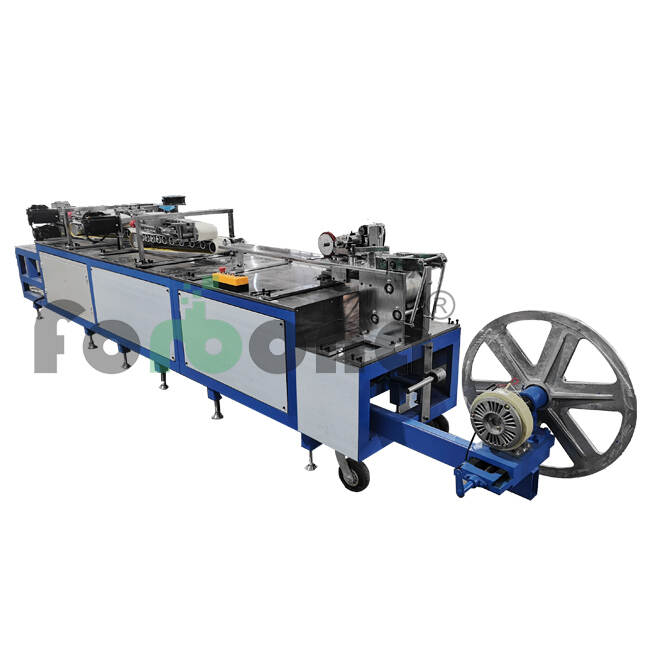Email format error
Email cannot be empty
Email already exists
6-20 characters(letters plus numbers only)
The password is inconsistent
Email format error
Email cannot be empty
Email does not exist
6-20 characters(letters plus numbers only)
The password is inconsistent


Everything You Need to Know About the Paper Stick Machine: An Ingenious Innovation
In today’s world, where environmental consciousness is taking center stage, industries are shifting from plastic to sustainable alternatives. One such innovation that’s making waves is the paper stick machine. While it might not sound as glamorous as self-driving cars or space exploration, this humble machine plays a crucial role in revolutionizing everyday products we often overlook, like cotton swabs, lollipops, and more.
In this blog, we’ll dive into the fascinating world of paper stick machines. We’ll explore how they work, their applications, and why they are key to promoting a greener planet. If you’ve ever wondered how something as simple as a paper stick is mass-produced with precision and speed, you’re in for a treat. Let’s unravel the magic behind the paper stick machine!
What is a Paper Stick Machine?
A paper stick machine is an industrial marvel designed to manufacture paper sticks used in various products. These machines take sheets or rolls of paper and transform them into durable cylindrical sticks that can replace their plastic counterparts.
Unlike traditional manufacturing methods, a paper stick machine operates with high efficiency, ensuring consistent quality while minimizing waste. The process involves rolling, cutting, drying, and bonding paper to create sticks that are strong enough to meet the demands of diverse applications.
How Does a Paper Stick Machine Work?
The process of making paper sticks might sound straightforward, but it involves a series of intricate steps to ensure the final product is both functional and environmentally friendly. Here’s a simplified breakdown:
Paper Roll Feeding:
Large rolls of paper are loaded into the machine. The paper is usually pre-treated to enhance durability and ensure smooth processing.
Glue Application:
The machine applies an eco-friendly adhesive along the paper’s surface. This ensures that the stick remains tightly rolled and sturdy.
Rolling Process:
The glued paper is rolled into a cylindrical shape with the help of precision rollers. This step is critical for achieving the desired diameter and uniformity.
Cutting to Size:
Once the paper is rolled, it’s cut into sticks of the required length. Advanced machines can produce sticks of varying sizes to cater to different applications.
Drying and Curing:
To enhance the stick’s strength, the machine dries and cures the paper using controlled heat or airflow. This step ensures the sticks don’t unravel or lose their shape.
Quality Control:
Finally, the finished sticks pass through quality control checks to ensure they meet industry standards for strength, uniformity, and finish.
Applications of Paper Sticks
Paper sticks might be small, but they have a big role to play in various industries. Here are some of the most common applications:
Cotton Swabs:
Cotton swabs, also known as Q-tips, are one of the most widely recognized uses for paper sticks. The shift from plastic to paper sticks in cotton swabs has significantly reduced plastic waste globally.
Lollipops:
Whether it’s a classic Chupa Chups or a gourmet handmade candy, lollipop sticks are now commonly made from paper instead of plastic.
Medical Applications:
Paper sticks are used in medical swabs for sample collection, ensuring both hygiene and sustainability.
Hygiene Products:
From makeup applicators to ear cleaners, paper sticks are finding their way into a wide range of personal care items.
Craft and DIY Projects:
Eco-conscious artists and crafters often use paper sticks in their projects, thanks to their strength and versatility.

Why is the Paper Stick Machine a Game-Changer?
The rise of the paper stick machine aligns with a broader global movement to reduce plastic waste. Here are some reasons why this technology is a game-changer:
1. Eco-Friendly Alternative
Traditional plastic sticks contribute significantly to pollution, especially in marine ecosystems. Paper sticks, on the other hand, are biodegradable and compostable, making them a much greener option.
2. Cost-Effective Production
While switching to paper might seem costly initially, modern paper stick machines are designed for high efficiency, minimizing production costs in the long run.
3. Customizable Designs
These machines can produce paper sticks of various sizes, thicknesses, and even colors, catering to the unique needs of different industries.
4. Durability
Paper sticks are surprisingly strong, thanks to advanced manufacturing techniques. This durability makes them a viable replacement for plastic in most applications.
5. Regulatory Compliance
With governments around the world banning single-use plastics, businesses are under pressure to find sustainable alternatives. Paper stick machines make it easy to comply with these regulations while maintaining product quality.
Challenges in Paper Stick Production
Despite their many advantages, paper stick machines are not without challenges. Manufacturers must address several issues to optimize production:
Material Sourcing:
The quality of the paper used plays a crucial role in the durability of the sticks. Sourcing eco-friendly, high-quality paper can be a challenge.
Adhesive Selection:
Choosing the right adhesive is critical to ensure the sticks remain durable while adhering to sustainability standards.
Maintenance and Downtime:
Like any industrial equipment, paper stick machines require regular maintenance to prevent breakdowns and ensure consistent output.
Initial Investment:
For smaller manufacturers, the cost of acquiring and setting up a paper stick machine can be a significant barrier.
The Future of Paper Stick Machines
As technology continues to evolve, the future of paper stick machines looks promising. Here are some trends to watch out for:
Automation and AI:
Advanced machines are incorporating automation and artificial intelligence to optimize production and minimize human intervention.
Sustainable Materials:
Manufacturers are experimenting with recycled paper and other innovative materials to make the process even more eco-friendly.
Compact Designs:
Portable and compact paper stick machines are being developed to cater to small-scale businesses and startups.
Integration with IoT:
Internet of Things (IoT) technology is enabling real-time monitoring and predictive maintenance of machines, ensuring seamless operation.
Conclusion
The paper stick machine is a shining example of how simple innovations can have a profound impact on our planet. By replacing plastic sticks with sustainable paper alternatives, these machines are helping reduce pollution and pave the way for a greener future.
Whether you’re a manufacturer looking to adopt eco-friendly practices or just someone curious about how everyday items are made, understanding the role of the paper stick machine is a step toward appreciating the small yet significant changes shaping our world.
So, the next time you enjoy a lollipop or use a cotton swab, take a moment to appreciate the technology behind it. The paper stick machine might just be the unsung hero of your day!

